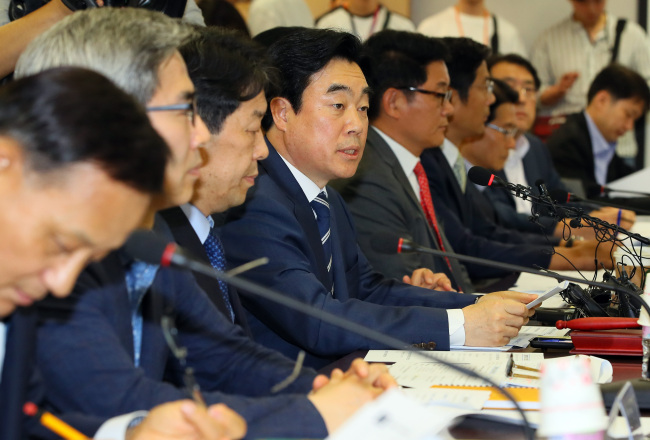A special presidential panel on Tuesday announced its fiscal reform plan, in accordance with the Moon Jae-in administration’s recently renewed pledge to reduce income disparity and achieve income-led growth.
The blueprint, raising the tax burden on owners of high value houses and multiple homes, was taken as a signal that the progressive government -- which has largely been preoccupied with North Korean issues throughout its first year -- shall henceforth place more focus on “economic justice.”
“Our fiscal reform proposal aims at maximizing the (nation’s) fiscal spending efficiency by reinforcing transparency and responsibility, and at achieving tax justice through a rational system” said Kang Byung-goo, chairman of the special presidential committee on fiscal reform.
 |
(Yonhap) |
The 28-member special panel, which has been in action since April this year, held a general meeting on the day to wrap up its state fiscal reform discussion and submitted its report to the Ministry of Strategy and Finance, according to officials.
The main agenda of the final suggestion was to expand the range of comprehensive real estate tax subjects, to hike the tax rate for the gray zone tax bracket and to gradually inch up the fair market value rate in order to reduce the substantive price gap.
“The real estate tax rate for the tax bracket of 600 million won ($534,760) or more should be raised by 0.05-0.5 percentage point,” the panel said in its report.
“We also recommend that (the government) consider increasing tax burdens for multiple home owners.”
As for the fair market value, its rate should climb gradually on an annual rate of 5 percentage points, the panel added.
The comprehensive real estate tax, first taking effect in 2005 under the late President Roh Moo-hyun, has long been deemed a disputed way of taxing expensive houses and multiple properties,
Despite its unprecedented goal to curb skyrocketing housing prices here, Seoul’s affluent Gangnam district mostly saw its apartment value rise in the following years, spreading skepticism.
The tax plan retreated further as the conservative Lee Myung-bak administration eased the tax system, raising the tax cluster baseline from the previous 600 million won to 900 million won.
“The alleviation drastically cut down on the number of corresponding taxpayers and the total amount paid, eventually undermining the nation’s tax justice,” the panel report said.
Upon Lee’s revision, the number of comprehensive real estate taxpayers dipped 47.3 percent, with the total amount nosediving by 77 percent from a year earlier, data showed.
The incumbent progressive Moon government, which largely succeeds the political lineage of the Roh administration, has long been inclined to increase the burden for top-tier real estate owners. But its lackluster achievement in the economic sector -- including the slower-than-expected economic recovery and sluggish employment indexes -- was considered a roadblock.
A survey by local pollster Gallup Korea showed last week that 43 percent of the respondents cited economic reasons in their negative assessment of Moon’s state affairs capacity, displaying a visible contrast with a majority who gave positive responses to Moon’s actions in the national security and foreign affairs sectors.
In light of such public sentiment, the presidential office Cheong Wa Dae replaced three of its top economic-related officials, marking the first top-level reshuffle in the Blue House since Moon took office in May last year.
Yoon Jong-won, Jung Tae-ho and Lee Yong-sun were respectively named senior secretary for economic affairs, senior secretary for job creation and senior secretary for civil affairs.
Meanwhile, the government is expected to announce a set of plans on providing special support for the low-income clusters, elderly citizens and the jobless. These supplementary actions, led by Deputy Prime Minister and Finance Minister Kim Dong-yeon, came in the wake of latest statistics showing growing income disparity, despite the government’s pledge for fair economic order.
The minimum wage commission, which has so far been stalled amid disputes on the wage hike consequences, is slated to finalize next year’s legal minimum wage by mid-July, according to officials.
By Bae Hyun-jung
(
tellme@heraldcorp.com)








